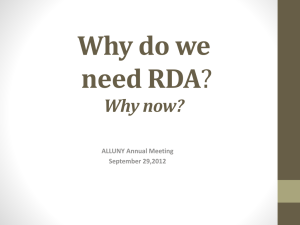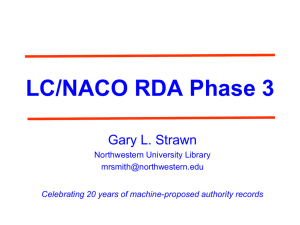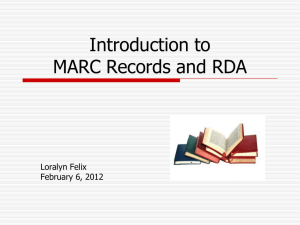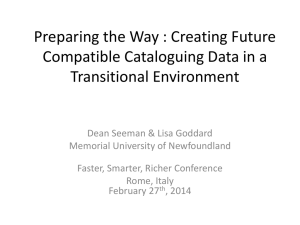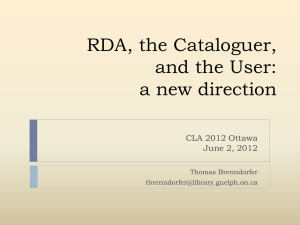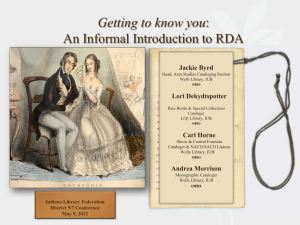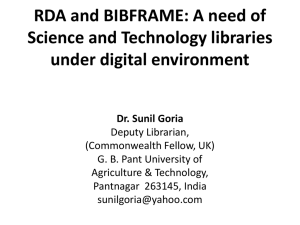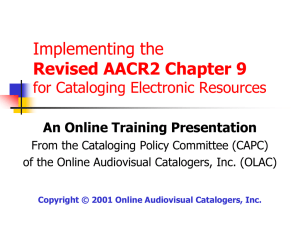Slides for Erin Stalberg`s Presentation
advertisement
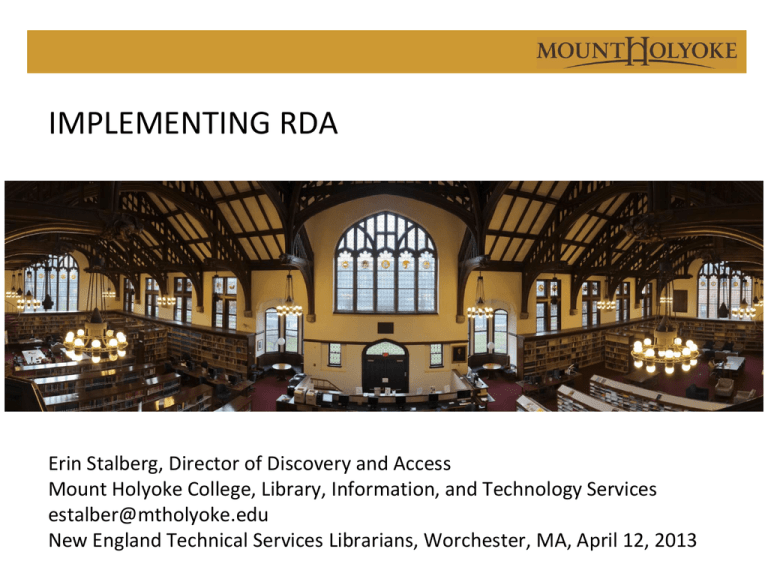
IMPLEMENTING RDA Erin Stalberg, Director of Discovery and Access Mount Holyoke College, Library, Information, and Technology Services estalber@mtholyoke.edu New England Technical Services Librarians, Worchester, MA, April 12, 2013 How many of you … • Have done any cataloging in RDA? • Have any RDA records in your catalog? – You ALL do!! How many of you … • Have done any cataloging in RDA? • Have any RDA records in your catalog? – ofYou ALL do!!(dx:rda) As April 3, 2013 193,270 RDA records in OCLC 118,241 (61% of the total) LC RDA records in OCLC 48,040 (2% of 2012 imprints) RDA records in OCLC – 2012 imprints 26,943 (6% of 2013 imprints so far) RDA records in OCLC – 2013 imprints 5,037 RDA records in Five College catalog 627 RDA e-book records in Five College catalog How many of you … • Have done any cataloging in RDA? • Have any RDA records in your catalog? – You ALL do!! • Changed anything in your OPAC display? • • • • Added any MARC/RDA elements to your indexes? Watched an RDA webinar? Been to RDA rules training? Been to a FRBR class/watched a webinar? IMPLEMENTING RDA IN CONTEXT CONTEXT & DEMOGRAPHICS NCSU • 18 Metadata & Cataloging staff MHC 6 in Monographs 6 in Serials & Continuing Resources • 5.5 Technical Services staff 4 in Metadata & Data Quality 1 Technology Support for Technical Services – 1 Department Head (0.5 FTE) – 2 in Electronic Resources/Serials Highly centralized – 2 in Acquisitions/Copy-cataloging 2010-2011 cataloging output – 1 in ILL – 119,466 physical & electronic titles (MARC) • Highly centralized – 33,131 physical volumes (MARC) • 2010-2011 cataloging output – 5,767 digital image assets (non-MARC) – 36,082 physical & electronic titles (MARC) – 550 linear feet of manuscript materials (non-MARC) – 12,608 physical volumes (MARC) – 3,142 faculty citations (non-MARC) – – – – • • “RAPIDCAT” IN ACQ @ NCSU • • • • • NCSU uses YBP and WorldCat Cataloging Partners Quick copy-cataloging review upon receipt Checklist based on presence/absence of MARC tags – 050 or 090 – 245 -- Author and title must match title page – 250 -- Matches what is on item – 650, 651, 600, 610, 611, 630 -- record has at least one of these tags – 300$e -- has accompanying materials – etc. Acquisitions staff did not really ever know AACR2! RDA orientation, not training METADATA & CATALOGING @ NCSU • Materials that bounce out from RapidCat (complex copy, variant editions, full originals) • Materials that are not purchased (i.e. gifts, NCSU digital collections, librarian-selected websites) • Materials that are not bought title-by-title (i.e. e-journals, e-books, patron-driven) METADATA & CATALOGING @ NCSU • About 5% of NCSU MARC cataloging is original • Much of that is new editions and/or electronic derived from print • NCSU is not a participant in the PCC • MLS holding librarians are doing (next to) no cataloging • Support staff are doing all copy AND original cataloging and both MARC and non-MARC cataloging CATALOGING @ MHC • • • • • MHC uses YBP and WorldCat Cataloging Partners Less than 5% of MHC MARC cataloging is original MHC is not a participant in the PCC MLS holding librarians are doing (next to) no cataloging Support staff are doing all copy cataloging and both MARC and non-MARC cataloging • Original cataloging is mostly outsourced to UMASS Amherst • No difference between acquisitions staff and cataloging staff STEP 1: GET TRAINED • Who thinks getting trained is expensive? FREE FREE FREE FREE FREE FREE FREE FREE • Library of Congress (LC) RDA Training Materials – http://www.loc.gov/catworkshop/RDA%20training%20materials/LC%20RDA% 20Training/LC%20RDA%20course%20table.html • Program for Cooperative Cataloging (PCC) Training: – http://www.loc.gov/catworkshop/RDA%20training%20materials/index.html • ALCTS Webinars (free after 90 days) – http://www.ala.org/alcts/confevents/upcoming/webinar/cat • RDA-L – http://www.rda-jsc.org/rdadiscuss.html • OCLC – https://www.oclc.org/rda/about.en.html • LChelp4rda@loc.gov – Email address to contact LC for questions about rules NOT FREE • RDA Toolkit – http://www.rdatoolkit.org • Published books • ALCTS webinars, for the first 90 days after event • ALA pre-conferences and other paid training (Lyrasis, etc.) STEP 2: GET YOUR SYSTEM IN ORDER • Display 336, 337, 338 in the OPAC or not? – Decide if you want to do anything interesting with them • If no, do you care about loss of GMD? • Display 264 • Index 264, 336, 337, 338, 040$e • If you load authorities, be prepared for the influx of changed authority records. This is happening now. STEP 3: OTHER POLICY DOCUMENTS • OCLC Policy Statement, effective March 31, 2013 – https://www.oclc.org/rda/new-policy.en.html • PCC RDA Provider-Neutral Guidelines – http://www.loc.gov/aba/pcc/scs/documents/PN-RDA-Combined.docx • PCC Hybrid Record Guidelines – http://www.loc.gov/aba/pcc/rda/PCC%20RDA%20guidelines/PostRDA-Implementation-Guidelines.html#Hybrid – (separate documents for monographs/serials/integrating resources) OCLC POLICY STATEMENT, March 31, 2013 • • • • • • When adding a new record unique to WorldCat, the records may be coded for RDA, AACR2, or any other recognized cataloging code. The preferred order of 040 subfields is: a, b, e, c, d. Do not change RDA master records to conform to an earlier cataloging code. Catalogers may change/upgrade master records cataloged according to a non-RDA code to RDA. Do this only with the "piece in hand" in order that all necessary information will be available. When re-cataloging to RDA, the entire record must be examined and adjusted as needed before re-coding the record as RDA. OCLC will retain the 245 h GMD for a period of 3 years in WorldCat records where it currently exists. Catalogers editing existing non-RDA records are asked to leave formerly valid GMDs present in records through 31 March 2016. However, do remove the GMD when re-cataloging (and re-coding) a record as RDA. Read the policy for information on OCLC’s plans for machine manipulation. PCC HYBRID RECORD GUIDELINES • Enhancing with RDA elements versus re-describing/re-coding/ re-cataloging as RDA • Do NOT remove valid AACR2 elements or valid RDA elements when enhancing records. • Do NOT recode the descriptive rules for these minor additions. • The goal of editing a bibliographic record should be focused on enhancing the record to improve user access to the resource by contributing to the user tasks: find, identify, select, and obtain. • Be nice! Avoid ‘editing wars’ that are merely stylistic • Do no harm! Retain elements that are correct, even if you would not normally supply them yourself. If it's not wrong, leave it alone. • Ask first if you are not sure. PCC HYBRID RECORD GUIDELINES • It is recommended that the 245 subfield h GMD be retained for a period of time and not deleted, even though this element will eventually be replaced in function by the 336, 337, and 338 fields. • With the piece in hand, you can re-describe a resource and re-code the record as RDA instead of creating a hybrid record. • Example enhancements (do not recode as RDA): – 1XX-- Correct as necessary to synchronize with authorized form – 245 -- May add or edit statements of responsibility to reflect elements not transcribed previously. (but do not change “[sic]” and “[i.e.]” which were used to correct a title proper in AACR2) – 260 -- May convert 260 field to 264 field(s). You may change Latin abbreviations "S.l." or "s.n." to their spelled out RDA equivalents, e.g., "Place of publication not identified" and "publisher not identified". It is ok to leave them in the record. – 336/337/338 -- These may be added to enhance access. – Relationship designators -- Feel free to add approved RDA relationship designators. LOCAL POLICY DEVELOPMENT @ NCSU • Policy setting v. use of catalogers judgment • Alternatives/optional omissions/optional deletions – To follow LC or not to follow LC? • Relationship designators • Rule of 3 • Criteria for upgrading copy & Deriving records Five College Parking list Relationship designators? Decide as a 5C? High For original cataloging, yes. for copy, if warranted because of community or ease. Prepare for influx of redistributed authority records High Possibly wait until May and do all the loads then rather than month to month? Set up record review structure/listserv/group/as k for help? High Using Connexion review file; sending emails to 5C Tech Services List 264 field, have we indexed this and decision about display? High 3/5/13 -- Currently displayed, not indexed. Steve will index. Do we want a 5C Day One? High No https://sites.google.com/a/mtholyoke.edu/rda/home/parking-lot Five College Parking list Think about the TYP field, should it pull from 336/337/338? Medium Not Now Index relator terms? Medium Steve will create test index so we can see how they'd behave. Talk to RIO, Sys/OPAC Anything to prioritize for global change? Medium Not Yet Change algorithm for preferred record, should it be the RDA record? Medium currently: contents notes, # of subject headings, deprecate microform. Put 336/337/338 in a more specific index? Low Currently indexed in general index. Steve will create 4 separate indexes (336, 337, 338, 040$e) https://sites.google.com/a/mtholyoke.edu/rda/home/parking-lot CONTEXT • NCSU did not cover in training changes to types of materials NCSU does not often collect: – – – – Parts of the Bible Rare books Treaties Music • Both NCSU and MHC did not train in-depth on the new MARC Authority Record fields … just enough to be able to read an RDA authority record Some things to ponder from the NCSU cataloger surveys for the US National Libraries RDA Test … “Because this was my first RDA bibliographic record I checked everything I could find in the RDA toolkit. I learned a lot in training but not comfortable yet. I did a lot of second guessing my cataloger's judgment.” – NCSU cataloger “I ended up reviewing Adam Schiff's examples for conferences, and then used his reference to track down the RDA info I wanted to consult. I didn't have much luck going straight to the toolkit to find the area I needed.” – NCSU cataloger “Some of the changes between AACR2 and RDA make it difficult to catalog in both simultaneously. I spent an unnecessary amount of time tracking down a rule that I've followed without thinking for many years because I couldn't remember if the rule as I was remembering it was the old (AACR2) way or the new (RDA) way. In sorting this out, I believe I came to realize that my last record (RDA) had AACR2-inspired errors. Having individual testers using two sets of rules may affect the record times.” – NCSU cataloger “The relator codes are not as easy to apply as I thought they would be ... before actually creating a record, I had thought they would be straightforward and easy to assign. Not so much.” – NCSU cataloger “I think our local training was confusing regarding relator codes for distinguishing between a name (RDA 9.15) and relationship designators (Appendix I).” – NCSU cataloger “The resource was a distinctively titled, annual issue of a particular section of a newspaper. The Toolkit was not very helpful in this situation. I did a search on supplements but was more concerned with the MARC21 fields to use and the ISBD punctuation. I relied on my prior knowledge of CONSER standards for my approach to the cataloging of this resource. As for the RDA components of the cataloging, I tried to pay special attention to the transcription fields and the 3XX fields.” – NCSU cataloger “Many of the rules for the handling of Conferences as serials were developed by CONSER and there should be some reference to what rules have been updated and which are still subject to CONSER description.” – NCSU cataloger “I had difficulty determining what rules came into play when deciding on access points. I decided to include several names in the statement of responsibility for completeness sake, but I didn't feel that they merited access points. RDA training I received seemed to indicate that this was acceptable, and conferring with a co-worker yielded the same conclusion, but I was unable to find a clear reference in the toolkit stating what should and should not be considered for an access point. Perhaps this was because I tended to limit my searches to subjects relevant to what was being encoded (statement of responsibility), so perhaps this is stated explicitly somewhere in more general rules.” – NCSU cataloger “A little Latin never hurt anyone.” – NCSU cataloger SOME USEFUL THINGS TO CONSIDER • Support staff consult AACR2 directly much less frequently than we would like to admit aloud. • The distinctions between encoding standards & content standards is much less well understood than we would like to admit aloud. • We [normal people] catalog from examples. • Staff have trouble distinguishing between the RDA rules and the RDA Toolkit. • We have socio-cultural-political realities in our institutions. SOME USEFUL THINGS TO CONSIDER • People like examples. • Catalogers like rules. • Catalogers like when expectations are clear and documentation is up to date. • Support staff like when their bosses know the answers to their questions. • Cataloging managers like when LC figures things out first. NCSU TIMING ANALYSIS Record creation times at the end of the test period: 15-40 minutes for original book cataloging 5-20 minutes for copy book cataloging These times match NCSU’s existing local data for AACR2 book record creation. Average time per record decreased 40% by the end of the test. For books, ebooks and ejournals we noted a steady decrease in record creation time 75% of NCSU catalogers showed increased rapidity in record creation over the course of the test. The majority of print serials were cataloged by 3 individuals and despite repeat cataloging, time to catalog did not decrease much over time. We have no idea why. CATALOGER’S JUDGMENT • For efficiency, how much judgment do we actually want to encourage in copy-cataloging? – trust other people’s judgment! • “Cataloger’s judgment” needs something to be grounded in. – FRBR user tasks – We are all responsible for the cost/value decisions in our libraries • Support staff catalogers may never have engaged in these issues before. PONDERING THE VARIANCE OF MILEAGE … • when nearly all of your cataloging is copy • when nearly all of your cataloging is outsourced • when your same (few) technical services staff do pretty much all technical services functions • when you have significantly fewer resources to devote to professional development PONDERING THE VARIANCE OF MILEAGE … • Make sure your system behaves the way you want (tables are up to date/fields are indexed and displayed) • Accept RDA copy • Live with uncertainty • Realize that you have other priorities (it’s ok!) • Read the listservs, stay in touch with the community to whatever extent you can afford • Follow RDA examples in your original cataloging • Wait for the vendors to figure out everything else … Image Credits Photos of Mount Holyoke Colleges, Williston Library • Slide 1: © James Gehrt, 2013. • Slide 5: ©Mount Holyoke College, [date not identified]. http://www.mtholyoke.edu Photo of NCSU, D.H. Hill Library • Slide 5: ©Edward Funkhouser, 2008. • http://historicalstate.lib.ncsu.edu/catalog/4funk_DH_Hill_E ast_Wing
